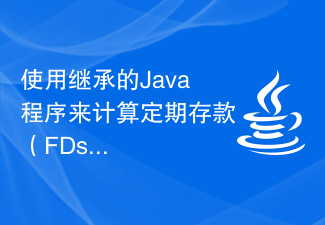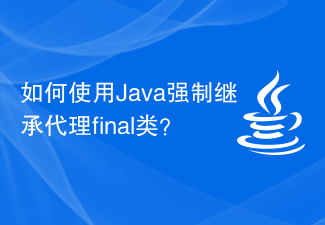 Java
Java javaTutorial
javaTutorial How to force inheritance of proxy final class in Java programming to achieve specific needs?
How to force inheritance of proxy final class in Java programming to achieve specific needs?
How to force inheritance of the proxy final class in Java programming to achieve specific needs?
In Java programming, sometimes we encounter situations where we need to inherit a certain final class, but due to the characteristics of the final class, we cannot directly inherit it to achieve specific needs. However, by using the proxy pattern, we can indirectly implement inheritance and extension of final classes. This article will introduce how to use the proxy pattern to force inheritance of the proxy final class to achieve specific needs.
First, let’s take a look at the proxy mode. The proxy pattern is a structural design pattern that allows us to control access to the original object by introducing a proxy object. The proxy object and the original object have the same interface, so the client does not need to care about the specific implementation details and only needs to access the original object through the proxy object.
In Java, we can use interfaces and classes to implement the proxy pattern. The interface proxy uses the dynamic proxy mechanism, while the class proxy uses the static proxy mechanism. For inheritance of final classes, we can use class proxies to achieve it.
The specific implementation idea is to create a proxy class, which inherits from the final class, rewrites the methods in the final class, and calls the corresponding method of the final class in the specific implementation of the method to achieve indirect inheritance and extension. The purpose of the final class.
Below we demonstrate this process through a specific example:
public final class FinalClass {
public void doSomething() {
System.out.println("FinalClass doSomething");
}
}
public class ProxyClass extends FinalClass {
private FinalClass finalClass;
public ProxyClass(FinalClass finalClass) {
this.finalClass = finalClass;
}
@Override
public void doSomething() {
System.out.println("ProxyClass doSomething");
finalClass.doSomething();
}
}
public class Main {
public static void main(String[] args) {
FinalClass originalClass = new FinalClass();
ProxyClass proxy = new ProxyClass(originalClass);
proxy.doSomething();
}
}In the above example, we have a final class FinalClass, which has a method doSomething. We cannot directly inherit FinalClass, so we created a proxy class ProxyClass to indirectly inherit FinalClass.
In ProxyClass, we hold a FinalClass object and call the doSomething method of finalClass in the doSomething method. In this way, when we call the doSomething method of the proxy class, "ProxyClass doSomething" will be output first, and then the doSomething method of finalClass will be called, and "FinalClass doSomething" will be output.
Through the above implementation, we indirectly inherit the final class FinalClass and extend its functions. This method can be applied to various scenarios, such as enhancing final classes, intercepting or modifying original behaviors.
In summary, by using the proxy pattern, we can force inheritance of the proxy final class to achieve specific needs. This method can solve the problem of being unable to directly inherit final classes, and can flexibly extend and modify the original behavior. I hope this article can help you understand and apply the proxy pattern in Java programming.
The above is the detailed content of How to force inheritance of proxy final class in Java programming to achieve specific needs?. For more information, please follow other related articles on the PHP Chinese website!
 解决PHP报错:继承父类时遇到的问题Aug 17, 2023 pm 01:33 PM
解决PHP报错:继承父类时遇到的问题Aug 17, 2023 pm 01:33 PM解决PHP报错:继承父类时遇到的问题在PHP中,继承是一种重要的面向对象编程的特性。通过继承,我们能够重用已有的代码,并且能够在不修改原有代码的情况下,对其进行扩展和改进。尽管继承在开发中应用广泛,但有时候在继承父类时可能会遇到一些报错问题,本文将围绕解决继承父类时遇到的常见问题进行讨论,并提供相应的代码示例。问题一:未找到父类在继承父类的过程中,如果系统无
 如何在PHP中使用多态和继承来处理数据类型Jul 15, 2023 pm 07:41 PM
如何在PHP中使用多态和继承来处理数据类型Jul 15, 2023 pm 07:41 PM如何在PHP中使用多态和继承来处理数据类型引言:在PHP中,多态和继承是两个重要的面向对象编程(OOP)概念。通过使用多态和继承,我们可以更加灵活地处理不同的数据类型。本文将介绍如何在PHP中使用多态和继承来处理数据类型,并通过代码示例展示它们的实际应用。一、继承的基本概念继承是面向对象编程中的一种重要概念,它允许我们创建一个类,该类可以继承父类的属性和方法
 使用继承的Java程序来计算定期存款(FDs)和定期存款(RDs)的利息Aug 20, 2023 pm 10:49 PM
使用继承的Java程序来计算定期存款(FDs)和定期存款(RDs)的利息Aug 20, 2023 pm 10:49 PM继承是一个概念,它允许我们从一个类访问另一个类的属性和行为。被继承方法和成员变量的类被称为超类或父类,而继承这些方法和成员变量的类被称为子类或子类。在Java中,我们使用“extends”关键字来继承一个类。在本文中,我们将讨论使用继承来计算定期存款和定期存款的利息的Java程序。首先,在您的本地机器IDE中创建这四个Java文件-Acnt.java−这个文件将包含一个抽象类‘Acnt’,用于存储账户详情,如利率和金额。它还将具有一个带有参数‘amnt’的抽象方法‘calcIntrst’,用于计
 PHP中的封装技术及应用Oct 12, 2023 pm 01:43 PM
PHP中的封装技术及应用Oct 12, 2023 pm 01:43 PMPHP中的封装技术及应用封装是面向对象编程中的一个重要概念,它指的是将数据和对数据的操作封装在一起,以便提供对外部程序的统一访问接口。在PHP中,封装可以通过访问控制修饰符和类的定义来实现。本文将介绍PHP中的封装技术及其应用场景,并提供一些具体的代码示例。一、封装的访问控制修饰符在PHP中,封装主要通过访问控制修饰符来实现。PHP提供了三个访问控制修饰符,
 PHP中的多重继承Aug 23, 2023 pm 05:53 PM
PHP中的多重继承Aug 23, 2023 pm 05:53 PM继承:继承是面向对象编程(OOP)中的一个基本概念,它允许类从其他类继承属性和行为。它是一种基于现有类创建新类的机制,促进代码重用并建立类之间的层次关系。继承基于"父子"或"超类-子类"关系的概念。从中继承的类被称为超类或基类,而继承超类的类被称为子类或派生类。子类继承其超类的所有属性(变量)和方法(函数),还可以添加自己独特的属性和方法或覆盖继承的属性和方法继承的类型在面向对象编程(OOP)中,继承是一个基本概念,它允许类从其他类中继承属性和行为。它促进
 如何使用Java强制继承代理final类?Sep 06, 2023 pm 01:27 PM
如何使用Java强制继承代理final类?Sep 06, 2023 pm 01:27 PM如何使用Java强制继承代理final类?在Java中,final关键字用于修饰类、方法和变量,表示它们不可被继承、重写和修改。然而,在某些情况下,我们可能需要强制继承一个final类,以实现特定的需求。本文将讨论如何使用代理模式来实现这样的功能。代理模式是一种结构型设计模式,它允许我们创建一个中间对象(代理对象),该对象可以控制对另一个对象(被代理对象)的
 继承、多态与接口:PHP面向对象的三大特性May 11, 2023 pm 03:45 PM
继承、多态与接口:PHP面向对象的三大特性May 11, 2023 pm 03:45 PMPHP是一种服务器端编程语言,自PHP5之后开始支持面向对象编程(OOP)。OOP的核心思想是将数据和行为封装在对象中,以提高程序的可维护性和可扩展性。在PHP中,面向对象编程具有三大特性:继承、多态与接口。一、继承继承是指一个类可以从另一个类中继承属性和方法。被继承的类称为父类或基类,继承的类称为子类或派生类。子类可以通过继承获得父类中的属性和方法,并且可
 如何在Go语言中实现封装和继承Jul 23, 2023 pm 08:17 PM
如何在Go语言中实现封装和继承Jul 23, 2023 pm 08:17 PM如何在Go语言中实现封装和继承封装和继承是面向对象编程中的两个重要概念,它们可以使代码更加模块化和可维护,同时也为代码的复用提供了便利。本文将介绍在Go语言中如何实现封装和继承,并提供相应的代码示例。封装封装是将数据和功能进行封装,隐藏实现的细节,只暴露必要的接口给外部使用。在Go语言中,封装是通过导出和非导出标识符来实现的。首字母大写的标识符可以被其他包访


Hot AI Tools

Undresser.AI Undress
AI-powered app for creating realistic nude photos

AI Clothes Remover
Online AI tool for removing clothes from photos.

Undress AI Tool
Undress images for free

Clothoff.io
AI clothes remover

AI Hentai Generator
Generate AI Hentai for free.

Hot Article

Hot Tools

SublimeText3 Mac version
God-level code editing software (SublimeText3)

Dreamweaver CS6
Visual web development tools

ZendStudio 13.5.1 Mac
Powerful PHP integrated development environment

Safe Exam Browser
Safe Exam Browser is a secure browser environment for taking online exams securely. This software turns any computer into a secure workstation. It controls access to any utility and prevents students from using unauthorized resources.

PhpStorm Mac version
The latest (2018.2.1) professional PHP integrated development tool





